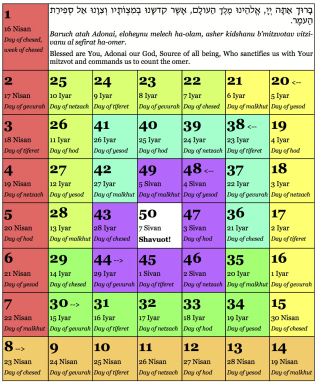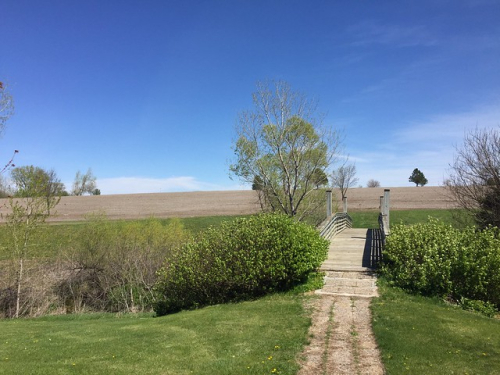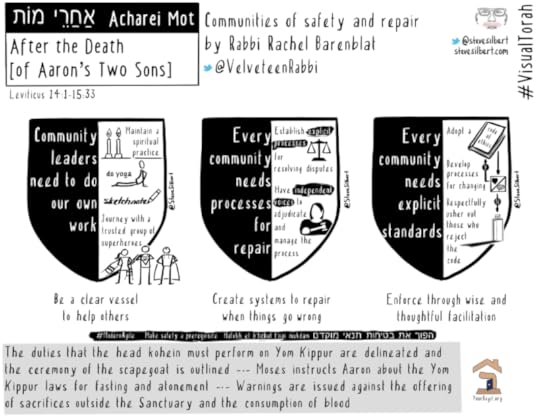Rachel Barenblat's Blog, page 59
May 3, 2019
Five days of a gift
This week I'm at a Benedictine retreat center in Schuyler, Nebraska, teaching at the Nebraska Five Day Academy for Spiritual Formation. Being here has been an extraordinary gift.
Getting to share facets of my beloved religious tradition with ardent spiritual seekers is a gift.
Getting to bear witness to their spiritual formation and their openness to growth and change is a gift.
Getting to learn from my fellow faculty (this time, Father John Mefrige, a Greek Orthodox priest of Syrian-Canadian descent) is a gift. Learning about Orthodox tradition, spirituality, and practice -- from icons, to chant, to prayer -- has been a gift.
Getting to pray three times a day in community is a gift. Getting to end and begin my days with prayer, getting to pause in the afternoon for prayer, is a gift.
Relaxing into the hands of skilled musical worship facilitators is a gift.
Getting to sit with my swirl of feelings about being a visitor in someone else's prayer space, prayer language, and modality of prayer is also a gift. Sometimes Christian prayer language is comfortable and familiar. Sometimes it's foreign. Sometimes it feels appropriative or pushes my buttons. Sometimes it lifts up my own prayer. Sometimes I struggle. All of those are a gift.
Getting to walk the labyrinth here, amidst greening spring grass and surrounded by the gently rolling terrain of eastern Nebraska, is a gift.
Teaching about service of the heart is a gift. Sharing prayer and poetry, psalms and music, grief and rejoicing, brokenness and wholeness is a gift.
Answering people's questions about Judaism and Jewish spiritual practice is a gift. The genuine appreciation for, and curiosity about, my tradition is a gift. Getting to share a prayer service in my language, my idiom, and my modalities is a gift.
Periods of silence and contemplation are a gift. Each hour of class is followed by an hour of silent time for contemplation, integration, and going deep, and that's a gift.
The participants' willingness to go deep is a gift.
Walking to the edge of the retreat center's landscaped grounds and standing at the edge of bare cornfields waiting to grow, under the vastness of the sky, feeling the powerful winds rolling down across the plains, is a gift.
Lifting my voice in harmony with others is a gift.
Getting to meet each night with the leadership team, and to partner with them in creating the container within which this retreat has unfolded, is a gift.
I'm so grateful to the leadership team at Great Plains Spiritual Formation, and to Upper Room Ministries, for giving me this opportunity to share and to teach -- and to drink from this well of togetherness, learning, silence, and song.

May 1, 2019
Communities of safety and repair - at Builders Blog
Acharei Mot (“After the Death” — e.g. the deaths of Aaron’s two older sons, which took place a few parshiot ago) is full of instructions from our ancient sacrificial past. This parasha is one part OSHA safety manual, one part instructions for community cohesion and forgiveness practices, and one part ethical guidebook for avoiding power differential transgressions. And while instructions for correctly dashing blood on an altar are no longer useful to us as modern Jews, the need for strong systems (to ensure safety, offer pathways for healthy reconciliation, and maintain high ethical standards especially where there is power imbalance) seems to be eternal.
Among the laws covered in Acharei Mot are proper dress in the holiest of places (behind the curtain in the mishkan); which animals to offer up as we seek to draw near to God, and how to sprinkle their blood; and the origins of the “scapegoat,” a story many of us also hear each year on Yom Kippur. We also find, sandwiched between injunctions not to behave like other regional tribes in the Ancient Near East, a string of instructions about power differential transgressions. What leaps out at me from these instructions is their (very contemporary) insistence on the importance of systems for creating and promoting safety, justice, and ethical behavior.
So what does Acharei Mot offer us in terms of best practices for our communities today? ...
That's the beginning of my latest post for Builders Blog, a project of Bayit: Building Jewish, with sketchnotes by Steve Silbert. Read the whole thing: Communities of Safety and Repair.

April 30, 2019
I don't mind
Today someone asked how I am
and I said fine and meant it.
Maybe I'm growing accustomed.
Maybe all those years of bracing
for your death paid off.
Maybe it's just the sunshine.
It's easier to be honest now
than it was when you were alive.
I don't have to worry
that I'm disappointing you.
And if I believe you hear me
then you're listening no matter what.
I know this ease won't last.
I'll see someone who looks
like you, or a mother
and daughter with heads close...
I can't even think about
the first Rosh Hashanah,
all the occasions to come.
But right this minute
with the trees leafing out
and birds chattering excitedly
I know you're dead
but I don't mind.

April 29, 2019
Field trip
You walked through my dream last night
as a crowd of family crossed a hotel lobby.
Your blonde hair blown-dry and styled,
full face of makeup, earrings gleaming.
"You look great," I said, and you beamed
as though you knew the secret: you're not
in this world anymore. Was it a field trip
to visit the living? I greeted your parents,
gone thirty years. And then I was alone.
I seized my phone to call a friend to tell
the tale. "Next time, ask her for a bracha,"
he suggested. Waking, I thought: what would
you say? In life you would have laughed, or
said you don't know how to give a blessing
but maybe in the afterlife you're less afraid.
Or maybe you'd repeat exactly what you said
in life: make hay while the sun shines. This
life is too short. Choose to find it sweet.

April 28, 2019
Stars
In your filing cabinet you left
notes for your obituary:
you played the doxology
on accordion
you earned
your junior lifesaving certificate
you wished you'd learned
to tapdance, or written a book.
You included for us a list
of loves: dad, of course
travel, a good party,
Judaism and your children
your nutritionist guru,
the Big Dipper, the moon.
On Nathan J. Pritikin
we part ways. I'm likelier
to emulate Samin Nosrat
scattering kosher salt
by the handful (sorry
Mom) but I love
that you loved the moon
enough to mention her, and
the other stars you steered by
still show me the way to shore.

April 27, 2019
Dishes
Your Pesachdik dishes lived
in cartons on a high shelf,
strictly for the Dallas cousins.
When you hosted seder
the "help" covered the kitchen
with foil, brought the boxes down.
Yours were plain white.
Some of mine are red,
gleaming like polished apples.
Others are hand-me-downs
in melon and aqua and blue,
a gift from another mother.
Does it comfort you to know
mothers reached out as I joined
this motherless daughter club?
Back to the dishes: I know
you never kept the Pesach.
Did you wonder
why I've reclaimed
traditions you and Dad
were glad to discard —
did you shake your head
at this pendulum swing
of generations? Still
you'd like my table this week,
bright as your nail polish,
vivid as a Fiesta parade.

April 26, 2019
Crossing the Sea
As you
lay dying
you gasped
"help me."
How terrifying
to let
your lungs
stop breathing
to trust
that you
would continue
even after
your body
had ceased.
To step
into waves
that crested
so high
and know
the waters
would part.
To feel
deep in
weary bones
that from
narrow straits
expansiveness beckoned,
that redemption
was waiting
on the
far shore.
Today is the seventh day of Pesach, the day on which tradition says we crossed the sea into freedom.

April 25, 2019
April dailies
The last time
I wrote daily poems
during April
you printed them
and paperclipped them
in a sheaf.
I was so grateful
that you saw me
even a little.
When I spotted them
on your bedside table
my cup overflowed.
What would you say
to these
April dailies?
Maybe you'd be
mortified: too
confessional, too
exposing. Or maybe
you'd be glad
to be remembered.
Truth is, Mom,
I'm writing them
for me. The words
help me breathe,
help the channels
of my heart open
so that love
can pour through.
Dare I hope
that wherever you are
however you are
you understand?

April 24, 2019
Songbird
In the open window
as we began seder.
Between the readings
a fountain of birdsong.
That’s your mother,
someone said, hushed.
I called us to silence.
Can everyone hear —
I think even the skeptics
felt you there.
What was it like
to visit us in that tiny body
gilding the room with song
we could almost understand?

April 23, 2019
Counting, listening, becoming - a d'varling for Acharei Mot and the Omer
 A few weeks ago I was talking about the Omer journey with my Journey Into Judaism class. Counting the Omer, you may remember, is this practice we do during the 7 weeks between Pesach and Shavuot, between liberation and revelation. Each week is linked with a different quality -- lovingkindness, boundaries and strength, harmony and balance, endurance, humble splendor, roots and generations, and the ineffable quality we call Shechinah: presence, in the sense of Divine Presence.
A few weeks ago I was talking about the Omer journey with my Journey Into Judaism class. Counting the Omer, you may remember, is this practice we do during the 7 weeks between Pesach and Shavuot, between liberation and revelation. Each week is linked with a different quality -- lovingkindness, boundaries and strength, harmony and balance, endurance, humble splendor, roots and generations, and the ineffable quality we call Shechinah: presence, in the sense of Divine Presence.
Each week, and each day within each week, is mapped to one of these qualities. This seven-week journey of counting gives us the opportunity to reflect on these qualities as they manifest in us. We get to ask ourselves: how do I express chesed, lovingkindness? How do I receive lovingkindness? What kind of repair do I need to do in my capacity to give or receive love?
And how do I express gevurah, boundaries and strength? Do I need stronger boundaries between myself and toxic people or institutions in my life? Or do I need more permeable boundaries so that my relationships have better give-and-take? What kind of repair work do I need to do in my boundaries and my strength? And so on.
In my class that day, someone noted that this sounds an awful lot like the inner work of teshuvah -- returning again, turning ourselves around, the work of discernment and repair in our relationship with self and God and others -- that we do in the weeks leading up to the Days of Awe. And I said: yes indeed! During the Omer, we're doing our inner work in order to prepare ourselves to be ready to receive Torah anew at Sinai on Shavuot. During the weeks leading up to the Days of Awe, we're doing our inner work in order to prepare ourselves to be ready to enter into a new year and to stand before God on Yom Kippur.
The two journeys are parallel. And this week's Torah portion offers a couple of connections between this journey in the spring and that journey in the fall. (This week, following Reform practice, we're reading from the first half of Acharei Mot.)
One piece of today's Torah portion tells the story of the scapegoat ritual, which is also read in many synagogues on Yom Kippur. Torah tells us to take two goats, draw lots and offer one goat up to God, and then symbolically confer the sins of the community onto the other goat and then send it into the wilderness. It was a way of cleansing the community of its missteps and misdeeds so they could have a clean slate and begin again.
And if that weren't enough of a link between this season and the fall holidays, then the Torah actually mentions Yom Kippur:
וְהָיְתָ֥ה לָכֶ֖ם לְחֻקַּ֣ת עוֹלָ֑ם בַּחֹ֣דֶשׁ הַ֠שְּׁבִיעִי בֶּֽעָשׂ֨וֹר לַחֹ֜דֶשׁ תְּעַנּ֣וּ אֶת־נַפְשֹֽׁתֵיכֶ֗ם וְכָל־מְלָאכָה֙ לֹ֣א תַעֲשׂ֔וּ הָֽאֶזְרָ֔ח וְהַגֵּ֖ר הַגָּ֥ר בְּתוֹכְכֶֽם׃
And this shall be to you a law for all time: In the seventh month, on the tenth day of the month, you shall practice self-denial; and you shall do no manner of work, neither the citizen nor the alien who resides among you.
כִּֽי־בַיּ֥וֹם הַזֶּ֛ה יְכַפֵּ֥ר עֲלֵיכֶ֖ם לְטַהֵ֣ר אֶתְכֶ֑ם מִכֹּל֙ חַטֹּ֣אתֵיכֶ֔ם לִפְנֵ֥י יְהוָ֖ה תִּטְהָֽרוּ׃
For on this day atonement shall be made for you to cleanse you of all your sins; you shall be clean before the LORD.
Sefaria translates it as, on the tenth day of the seventh month which is Tishri, we practice self-denial (many translations say "afflict our souls"), and abstain from work, and atonement is made for us. But my friend and hevruta Rabbi David Markus notes that a different reading can be offered here: t'anu et nafshoteichem can be read either as "afflict your souls," or as "answer with your souls." (The only difference in the two words is in the vowels, which are not written in the Torah scroll.)
How different that verse feels to me when it's an instruction not to afflict our souls, but to answer for them -- to take a reckoning of who we are and who we want to be; to seek to reconnect ourselves with what matters most; to cultivate and strengthen our good qualities and seek to shed our bad ones, so that we can live out the fullest expression of who we're meant to be in the world! (Rabbi David has written a beautiful d'var Torah exploring this teaching for AJR, and I'll link to it here when it's live.)
Answering for our souls is the work of Yom Kippur. And it's the work of the Omer count too. Each day is an invitation to pause and notice where we are in time, and an invitation to pause and notice who we are and how we are and what spiritual muscles we need to strengthen.
Because taking a good hard look at my relationship with love and boundaries and my own strength and my sense of balance and my perseverance and my humility and my willingness to shine and my willingness to really be present -- that is not a onetime task. And taking a good hard look at my habits and my practices and my excuses and the places where I let myself off the hook but shouldn't -- and the places where I don't let myself off the hook but should! -- that's not a onetime task either.
This is the work of spiritual life. Discerning who we aspire to be. Answering for our souls, answering to our souls. And then living out our intentions of becoming the people we're called to become. I think our tradition gives us these two seven-week windows during the year to focus on this stuff because our ancestors were human too. They knew that inner work isn't one-and-done.
Some of us just went seven days without leaven. And that can feel like an affliction of our souls, or at least an affliction of our bodies! But it doesn't have to be an affliction, it can be an opportunity. To realign our relationship with food. To realign our relationship with sustenance. To think about the metaphysical hametz of old stories and old hurts that we need to shed in order to be free.
Counting the Omer could feel like an obligation, just one more item to cross off the to-do list every day (or another place to fall short when we inevitably forget.) But it doesn't have to be. It can be an opportunity.
What would happen if we made space during these seven weeks of the Omer to listen to our souls? I mean -- sit still, sit in silence, or sit in prayer, or walk the labyrinth, go running, do yoga, shut off the distractions and the devices -- whatever it takes to help us listen to that still small voice, the spark of divinity within?
What spiritual muscles do we need to strengthen in order to do that listening -- and what spiritual muscles might our souls ask us to strengthen so that we can receive Torah anew at Sinai this Shavuot as the best versions of ourselves that we can become?
Deep thanks to R' David Markus for his teaching on תְּעַנּ֣וּ אֶת־נַפְשֹֽׁתֵיכֶ֗ם. This is the d'varling I offered at my shul this morning, cross-posted to CBI's From the Rabbi blog.

Rachel Barenblat's Blog
- Rachel Barenblat's profile
- 6 followers





